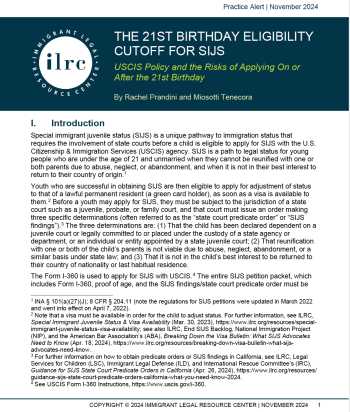Term Page
Immigrant Youth
The Trump administration’s Registration requirement for most undocumented immigrants is another hateful tactic in its campaign to cause panic and fear throughout the country. The Department of Homeland Security (DHS) has been clear that the central purpose of Registration is to gather information about all noncitizens and use this information to locate, apprehend and remove them as quickly as possible. The new registration requirement took effect April 11, 2025.
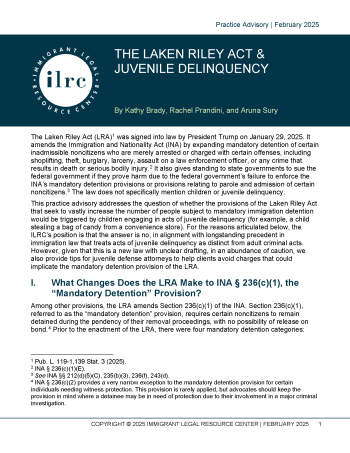
The Laken Riley Act (LRA) was signed into law by President Trump on January 29, 2025. It amends the Immigration and Nationality Act (INA) by expanding mandatory detention of certain inadmissible noncitizens who are merely arrested or charged with certain offenses. This practice advisory addresses the question of whether the provisions of the LRA that seek to vastly increase the number of people subject to mandatory immigration detention would be triggered by children engaging in acts of juvenile delinquency. In the advisory, we argue that the answer is no, in alignment with longstanding precedent in immigration law that treats acts of juvenile delinquency as distinct from adult criminal acts. However, given that this is a new law with unclear drafting, we also provide tips for juvenile defense attorneys to help clients avoid charges that could implicate the mandatory detention provision of the LRA.

On November 25, 2024, the ILRC submitted a comment on the Office of Refugee Resettlement’s (ORR) changes to various legal advocacy forms for children in ORR custody.
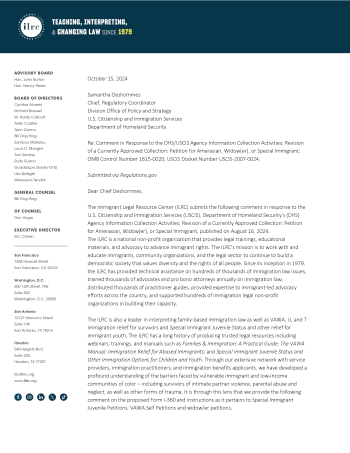
On October 15, 2024, the ILRC submitted a comment on the proposed changes to Form I-360, encouraging USCIS to increase the accessibility of the form for pro se respondents, including Special Immigrant Juvenile Status Applicants and VAWA self-petitioners.
Under current USCIS regulations, any person under 21 years of age who otherwise meets the eligibility requirements may be granted SIJS. This practice alert addresses many of the unsuccessful arguments that USCIS has not accepted when a petition received by USCIS after the youth turns 21. In rare cases, USCIS has accepted petitions received after the petitioner’s 21st birthday when there is proof that the petition was improperly rejected or receipted by USCIS before the deadline. This practice alert primarily focuses on USCIS Administrative Appeals Office (AAO) decisions and limited federal court cases to highlight successful and unsuccessful arguments when the SIJS petition is filed on or after the youth’s 21st birthday.
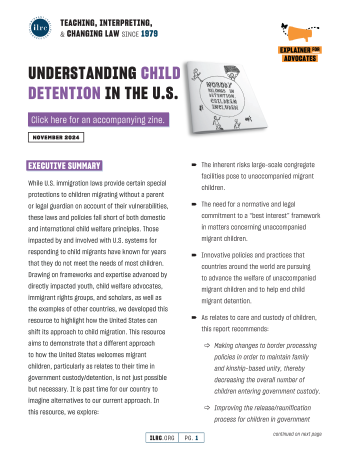
While U.S. immigration laws provide certain special protections to children migrating without a parent or legal guardian on account of their vulnerabilities, these laws and policies fall short of both domestic and international child welfare principles. Those impacted by and involved with U.S. systems for responding to child migrants have known for years that they do not meet the needs of most children. This resource aims to demonstrate that a different approach to how the United States welcomes migrant children, particularly as relates to their time in government custody/detention, is not just possible but necessary.
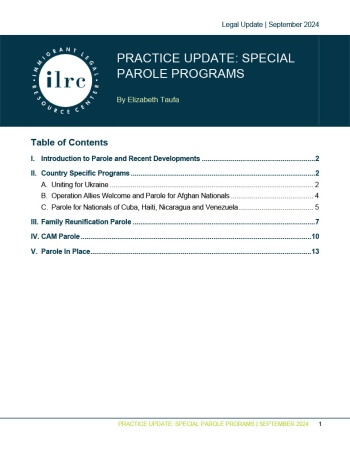
The advisory provides information and updates on various parole programs including Uniting for Ukraine, Operation Allies Welcome, CHNV Parole, Family Reunification Parole, CAM Parole, and Parole in Place.
